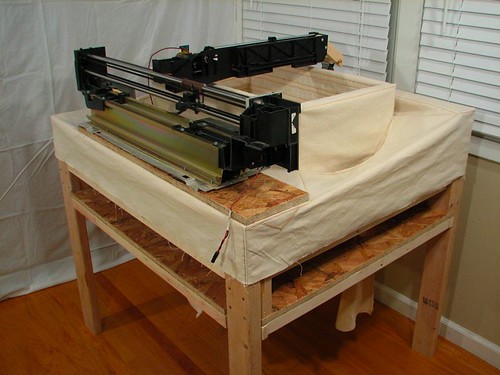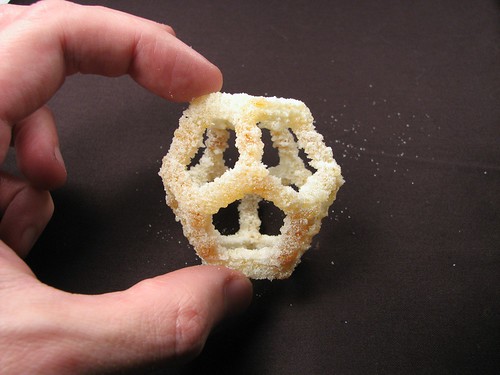I am deeply indebted to Emeka Okafor, author of the
Timbuktu Chronicles blog and director for the
TEDGlobal 2007 conference in Tanzania, for stumbling across this brilliant
Poptech video of
Professor Adrian Bowyer, the inventor of the
RepRap fabber. I would also like to thank Mr. Okafor for giving
attribution to my nanotechnology blog, and call attention to his postings on technologies that can help Africa and other developing regions. There is an Emeka Okafor who
plays basketball, I'm not sure if it's the same guy.
Bowyer talks about the
economics behind the project, particularly its ability to empower communities that are now economically depressed. There is some yummy game-theory stuff in the paper linked here that does not get mentioned in the video, check it out. He also talks about using
polylactic acid (
wikipedia) as a printing material for the RepRap. This is significant because you can make PLA from starchy vegetables like potatoes and corn, and when you're finished using your PLA object, you can compost it to help grow next year's crop of starchy vegetables. You can have a closed-loop local manufacturing economy that doesn't require trucks or trains or ships to move products around. In fact there are
several materials under consideration, and thought has been given to
printing a single product from multiple materials. The Fab@Home folks also have an
impressive list of materials that can be fabbed, including chocolate.
I got curious about PLA and did a little googling. In a RepRap forum there is a
discussion of just how easy it is to turn starchy vegetables into PLA. From the sound of it, it is non-trivial and demands that the person attempting it be quite knowledgeable. One person compares "home PLA production today to home biodesiel production 20 years ago, when it was arcane, a little dangerous, and rare, but theoretically possible" and notes that for many people it will simply not be economical compared to mail-ordering some PLA. I found a place that sells
utensils, plates, and cups made from PLA.
NatureWorks appears to be a source for PLA in ready-to-work form.
 Here's a PDF presentation about the CandyFab, an unusual approach to a hobbyist fabber. These guys decided they could relax their spatial resolution in favor of large volume and cheap fabbing materials. Their fabbing material of choice is sugar, much cheaper than the plastics used by RepRap. Some of the things they make are considerably larger than can be made with RepRap. Here's a Flickr photo set.
Here's a PDF presentation about the CandyFab, an unusual approach to a hobbyist fabber. These guys decided they could relax their spatial resolution in favor of large volume and cheap fabbing materials. Their fabbing material of choice is sugar, much cheaper than the plastics used by RepRap. Some of the things they make are considerably larger than can be made with RepRap. Here's a Flickr photo set.
 In September the CandyFabbers came up with a better hot air nozzle that gives them considerably improved spatial resolution, with volume pixels of about 1/16 inch instead of 1/5 inch.
In September the CandyFabbers came up with a better hot air nozzle that gives them considerably improved spatial resolution, with volume pixels of about 1/16 inch instead of 1/5 inch.
 The fabber idea is pretty simple. Take a hot glue gun and three stepper motors.
The fabber idea is pretty simple. Take a hot glue gun and three stepper motors.  Use the stepper motors under computer control (with appropriate mechanics) to position the hot glue gun at a specific XYZ point, and deposit a drop of hot glue. The glue cools and you move to the next XYZ point. Use this arrangement to draw a glue pattern on a horizontal surface, then move up a little bit and draw the next layer, and then the next. Soon you've got a 3D object of almost any shape you wish. A few of the details can vary -- it's not really glue, it's typically a polymer like
Use the stepper motors under computer control (with appropriate mechanics) to position the hot glue gun at a specific XYZ point, and deposit a drop of hot glue. The glue cools and you move to the next XYZ point. Use this arrangement to draw a glue pattern on a horizontal surface, then move up a little bit and draw the next layer, and then the next. Soon you've got a 3D object of almost any shape you wish. A few of the details can vary -- it's not really glue, it's typically a polymer like 

